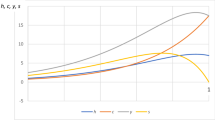Abstract
We investigate the intergenerational welfare implications of Generational Accounting when it is used as the basis for intertemporal fiscal policy decisions. In particular, we consider an economy with a PAYGO social security system out of steady state due to a permanent fall in fertility. In a highly stylized CGE overlapping generations model we illustrate that policy recommendations based on a standard application of Generational Accounting may not be compatible with intertemporal welfare maximization. Our model provides an example where such policies are either time inconsistent or welfare-decreasing.
Similar content being viewed by others
References
Aaron, H.J. (1966). The social insurance paradox. Canadian Journal of Economics and Political Science 32: 371-376.
Auerbach, A.J., Gokhale, J. and Kotlikoff, L.J. (1991). Generational Accounting: A meaningful alternative to deficit accounting. In D. Bradford (Ed.), Tax policy and the economy, Vol. 5: 55-110. Cambridge, MA: MIT Press.
Auerbach, A.J., Gokhale, J. and Kotlikoff, L.J. (1992). Generational Accounting: A new approach to understanding the effects of fiscal policy on saving. Scandinavian Journal of Economics 94: 303-318.
Auerbach, A.J., Gokhale, J. and Kotlikoff, L.J. (1994). Generational Accounting: Ameaningful way to evaluate fiscal policy. Journal of Economic Perspectives 8: 73-94.
Auerbach, A.J., Gokhale, J., Kotlikoff, L.J. and Steigum, E. (1993). Generational Accounting in Noway: Is Norway overconsuming its petroleum wealth? The Ruth Pollack Working Paper, No. 24. Boston University.
Auerbach, A.J. and Kotlikoff, L.J. (1987). Dynamic fiscal policy. Cambridge, MA: Cambridge University Press.
Boll, S., Raffelhüschen, B. and Walliser, J. (1994). Social security and intergenerational redistribution: A Generational Accounting perspective. Public Choice 81: 79-100.
Breyer, F. and Straub, N. (1993). Welfare effects of unfunded pension systems when labor supply is endogenous. Journal of Public Economics 50: 77-91.
Diamond, P.A. (1965). National debt in a neoclassical growth model. American Economic Review 55: 1126-1150.
Disney, R. (1996). Can we afford to grow older? Cambridge MA: MIT Press.
Fehr, H. and Kotlikoff, L.J. (1995). Separating efficiency from redistribution: Generational Accounting in a dynamic simulation model. NBER Working Paper No. 5090, Cambridge, MA.
Gokhale, J., Raffelhüschen, B. and Walliser, J. (1995). The burden of German unification: A Generational Accounting approach. Finanzarchiv 52: 141-165.
Haveman, R. (1994). Should generational accounts replace public budgets and deficits? Journal of Economic Perspectives 8: 95-111.
Kotlikoff, L.J. (1993). From deficit delusion to the fiscal balance rule - Looking for a sensible way to measure fiscal policy. Journal of Economics, Suppl. 7: 17-41.
Raffelhüschen, B. (1993). Funding social security through Pareto-optimal conversion policies. Journal of Economics, Suppl. 7: 105-131.
Samuelson, P.A. (1958). An exact consumption-loan model with or without the social contrivance of money. Journal of Political Economy 66: 467-482.
OECD - Organization for Economic Co-operation and Development (1988). Ageing populations - The social policy implications. Paris.
OMB - Office of Management and Budget (1994). Budget of the United States government, analytical perspectives, fiscal year 1995. Washington, DC: Government Printing Office.
Author information
Authors and Affiliations
Rights and permissions
About this article
Cite this article
Raffelhüschen, B., Risa, A.E. Generational accounting and intergenerational welfare. Public Choice 93, 149–163 (1997). https://doi.org/10.1023/A:1004976025770
Issue Date:
DOI: https://doi.org/10.1023/A:1004976025770




